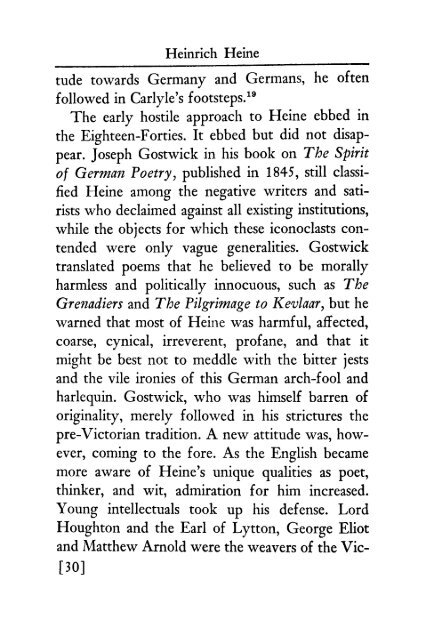HEINRICH HEINE - Repositories
HEINRICH HEINE - Repositories HEINRICH HEINE - Repositories
Heinrich Heine tude towards Germany and Germans, he often followed in Carlyle's footsteps.^* The early hostile approach to Heine ebbed in the Eighteen-Forties. It ebbed but did not disappear. Joseph Gostwick in his book on The Spirit of German Poetry, published in 1845, still classified Heine among the negative writers and satirists who declaimed against all existing institutions, while the objects for which these iconoclasts contended were only vague generalities. Gostwick translated poems that he believed to be morally harmless and politically innocuous, such as The Grenadiers and The Pilgrimage to Kevlaar, but he warned that most of Heine was harmful, affected, coarse, cynical, irreverent, profane, and that it might be best not to meddle with the bitter jests and the vile ironies of this German arch-fool and harlequin. Gostwick, who was himself barren of originality, merely followed in his strictures the pre-Victorian tradition. A new attitude was, however, coming to the fore. As the English became more aware of Heine's unique qualities as poet, thinker, and wit, admiration for him increased. Young intellectuals took up his defense. Lord Houghton and the Earl of Lytton, George Eliot and Matthew Arnold were the weavers of the Vic- [30]
Blackguard and Apostate torian Heine-legend. This legend, dominant in England ever since, effected a juster appraisal of the poet's work and greater tolerance towards his human failings. [31]
- Page 474: 120 J^eme* QUESTIONS. Beside the se
- Page 479 and 480: i^eine* 121 CHIVALRY, — that herm
- Page 481: ^dnt. 123 booth closed where ye use
- Page 485 and 486: THE ENGLISH LEGEND of HEINRICH HEIN
- Page 487 and 488: THE ENGLISH LEGEND oj HEINRICH HEIN
- Page 489: TO MAURICE JACOBS
- Page 493: PREFACE THE life of Heinrich Heine,
- Page 497 and 498: INTRODUCTION FOR a century and more
- Page 499: Introduction pre-Victorian days to
- Page 502 and 503: Heinrich Heine by a formal acknowle
- Page 504 and 505: Heinrich Heine his relationship to
- Page 506 and 507: Heinrich Heine sired to understand
- Page 508 and 509: Heinrich Heine sider the subject fu
- Page 510 and 511: Heinrich Heine crawling reptile —
- Page 512 and 513: Heinrich Heine their erstwhile coll
- Page 514 and 515: Heinrich Heine his imagination, his
- Page 516 and 517: Heinrich Heine man, and every man's
- Page 518 and 519: Heinrich Heine relations of all his
- Page 520 and 521: Heinrich Heine traitor and renegade
- Page 522 and 523: Heinrich Heine author of the Book o
- Page 526 and 527: CHAPTER II MARTYR OF MONTMARTRE THE
- Page 528 and 529: Heinrich Heine parties of Germany,
- Page 530 and 531: Heinrich Heine Duke of WeUington. M
- Page 532 and 533: Heinrich Heine tion turned about po
- Page 534 and 535: Heinrich Heine teenth birthday he w
- Page 536 and 537: Heinrich Heine ficial duties were n
- Page 538 and 539: Heinrich Heine ness of diction and
- Page 540 and 541: Heinrich Heine who was dying in an
- Page 542 and 543: Heinrich Heine land. He confessed:
- Page 544 and 545: Heinrich Heine average educated Eng
- Page 546 and 547: Heinrich Heine that the early hosti
- Page 548 and 549: Heinrich Heine in Clavigo, and we c
- Page 550 and 551: Heinrich Heine though o'erthrown is
- Page 552 and 553: Heinrich Heine impose their legend
- Page 554 and 555: Heinrich Heine ligned poet. Further
- Page 556 and 557: Heinrich Heine smile on human tears
- Page 558 and 559: Heinrich Heine ties, his failings c
- Page 560 and 561: Heinrich Heine through five edition
- Page 562 and 563: Heinrich Heine that helped him to f
- Page 564 and 565: Heinrich Heine the most famous of t
- Page 566 and 567: Heinrich Heine Dante, radiant Shake
- Page 568 and 569: Heinrich Heine Deep have embreathed
- Page 570 and 571: Heinrich Heine and continuator of t
- Page 572 and 573: Heinrich Heine there was in all Hei
Heinrich Heine<br />
tude towards Germany and Germans, he often<br />
followed in Carlyle's footsteps.^*<br />
The early hostile approach to Heine ebbed in<br />
the Eighteen-Forties. It ebbed but did not disappear.<br />
Joseph Gostwick in his book on The Spirit<br />
of German Poetry, published in 1845, still classified<br />
Heine among the negative writers and satirists<br />
who declaimed against all existing institutions,<br />
while the objects for which these iconoclasts contended<br />
were only vague generalities. Gostwick<br />
translated poems that he believed to be morally<br />
harmless and politically innocuous, such as The<br />
Grenadiers and The Pilgrimage to Kevlaar, but he<br />
warned that most of Heine was harmful, affected,<br />
coarse, cynical, irreverent, profane, and that it<br />
might be best not to meddle with the bitter jests<br />
and the vile ironies of this German arch-fool and<br />
harlequin. Gostwick, who was himself barren of<br />
originality, merely followed in his strictures the<br />
pre-Victorian tradition. A new attitude was, however,<br />
coming to the fore. As the English became<br />
more aware of Heine's unique qualities as poet,<br />
thinker, and wit, admiration for him increased.<br />
Young intellectuals took up his defense. Lord<br />
Houghton and the Earl of Lytton, George Eliot<br />
and Matthew Arnold were the weavers of the Vic-<br />
[30]



